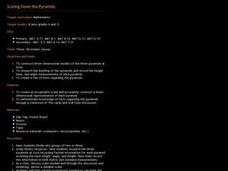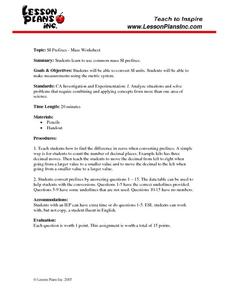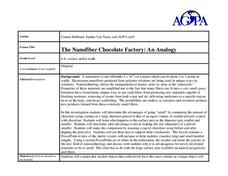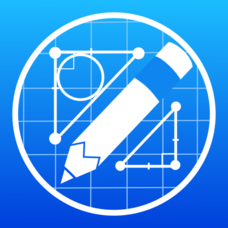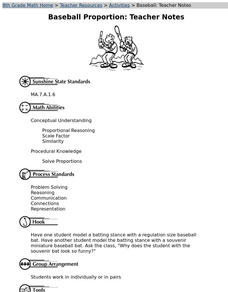Curated OER
Oscillations
Students construct and compare the actions of various pendulums. In this pendulum motion instructional activity, students build and test different types of pendulums. They conduct experiments with the length of the swing arm and apply...
Curated OER
The Reasons for the Seasons
Sixth graders conduct a controlled investigation to determine the length of the sun's shadow on a fixed object (i.e., flagpole, telephone pole, etc.) over a three-day period (one day in the fall, one in the winter, and one in the...
Curated OER
An Introduction to Chemistry
In this chemistry worksheet, students solve 47 problems involving measurement conversions from one unit to another. They explain how values should be reported from measurements.
Curated OER
Weather Dot Com
Students examine the need for a standard unit of temperature and measure temperature with a thermometer. They discuss the details of a thermometer and the calibrations used, record temperature data for inside and outside, explore...
Curated OER
Scaling Down the Pyramids
Students construct three-dimensional models of the three pyramids at Giza. They research the building of the pyramids and record the height, base and angle measurements of each pyramid. They create a file of facts regarding the pyramids.
Curated OER
SI Prefixes and Mass
In this SI prefixes and mass activity, learners are given measurements of mass and they covert to the given measurement by moving the decimal the proper number of places to the left or right.
Curated OER
The Nanofiber Chocolate Factory: An Analogy
Students investigate Nanotechnology. In this physic's lesson, students evaluate a hands-on model made from chocolate syrup and pretzels to determine the advantages of size. Students weigh chocolate syrup to determine it's wait in grams,...
Curated OER
Biospheres in Your Backyard
Students collect data from a local river biome. They use the information for metric conversion and graphing equations. They study the components of what makes up a biosphere and how math is used to analyze one.
Curated OER
How Much is a Million?
Fifth graders explore relationship among customary and/or metric units of measurement.
Curated OER
Matter
Students complete a unit of activities to learn about states of matter and how to measure matter. In this matter activity, students complete 8 lessons to learn about matter, its states, and how to measure matter.
Curated OER
Mr. Peanut Lab
In this peanut lab, students examine 10 different peanuts and take a variety of measurements. Using their measurements they answer 3 analysis questions.
Curated OER
Decimals, Meters, Centimeters: Taking It Further
In this decimal, meter and centimeter worksheet, students analyze units of measurement and rank them in order from smallest to largest. For the hands-on learner, students may cut out the number cards, move them around, and then place...
Curated OER
Decimals, Meters, Centimeters: Worksheet 7
In this meters learning exercise, 6th graders compare units of measure written in centimeters and meters. For the kinesthetic learner, students may cut out the twelve numbers. Students match centimeter units to an equivalent meter...
Curated OER
One Centimeter
In this centimeter worksheet, students read about and view examples of length in centimeters, then draw lines shorter and longer than 1 centimeter. A website reference for additional activities is given.
Bytes Arithmetic
Geometry Pad+
Graphing paper, pencil, ruler, protractor, and compass, all get replaced or supplemented with this dynamic geometry application. Here, you can create, move, and scale many different shapes, as well as, explore and change their properties...
Virginia Department of Education
Solar System Model
How many planets can you name? Did you get all 13 in our solar system, including the dwarf planets, or were you surprised when you read there are 13 planets? The instructional activity helps scholars understand the scale of the universe...
National Nanotechnology Infrastructure Network
The Micro and Macro World Around Us
Don't let your eyes play tricks on you ... use scale to keep your eyes in check! Young scholars observe images without scale and try to identify the structure. Then, they look at the same image with a scale bar and assess whether their...
Curated OER
What Can You Learn From A Mealworm?
Students collect data from mealworms. For this science and math lesson plan, students gain an understanding of collecting metric data using mealworms.
Curated OER
Surface Area with Polydrons
Students explore measurements by analyzing geometric shapes. In this surface area lesson, students identify the terms volume, weight, perimeter and area in order to find the requested measurements of specific polygons. Students utilize...
Curated OER
Genetic Variations in Hand Span Size
Students study genes. In this biology lesson plan, students measure their handspan size to determine if one pair or many pairs of genes control that trait.
Curated OER
Leaping Lemurs! How far can you jump?
Students watch a segment of the PBS video which show the lemurs' ability to jump. In pairs, students collect measurement data involving each other's length of a standard step, a standing broad jump, and a long jump. They record their...
Curated OER
Is It There?
Students participate in a lesson designed to illustrate these concepts using simple materials. They use Science process skills to observe, measure, predict, make inferences, and communicate while completing the activity. Proper safety...
Curated OER
Baseball Proportion
Eighth graders measure regular baseball bats and souvenir bats in centimeters. They determine how tall a person would be to be in proportion to the souvenir bat, create a poster depicting the person, and explain the proportional...
Curated OER
Puzzling Perimeters
Third graders use estimation, fractions and decimals to determine the perimeter of objects in the classroom. They are given a worksheet with a list of the items on it. The worksheet has columns beside each of the items for estimation and...






